Assessing Ecological Sustainability in Social Work
VerifiedAdded on 2019/09/26
|6
|2599
|172
Report
AI Summary
The assignment content discusses the concept of ecological sustainability and its relation to social work practices. The importance of theories such as systems and person-in-environment is highlighted, emphasizing the interconnectedness among all components within an ecosystem. However, it is noted that the ecological sustainability method lacks consideration of power dynamics. The Brundtland commission report emphasized the significance of catering to future generations in achieving sustainability. Social work offers valuable skill sets and tools necessary to address intergenerational equity issues characteristic of ecological approaches to sustainability. Overall, social work can play a crucial role in promoting ecological sustainability through developing trusteeship and enabling communities and individuals to protect and maintain local resources.
Contribute Materials
Your contribution can guide someone’s learning journey. Share your
documents today.
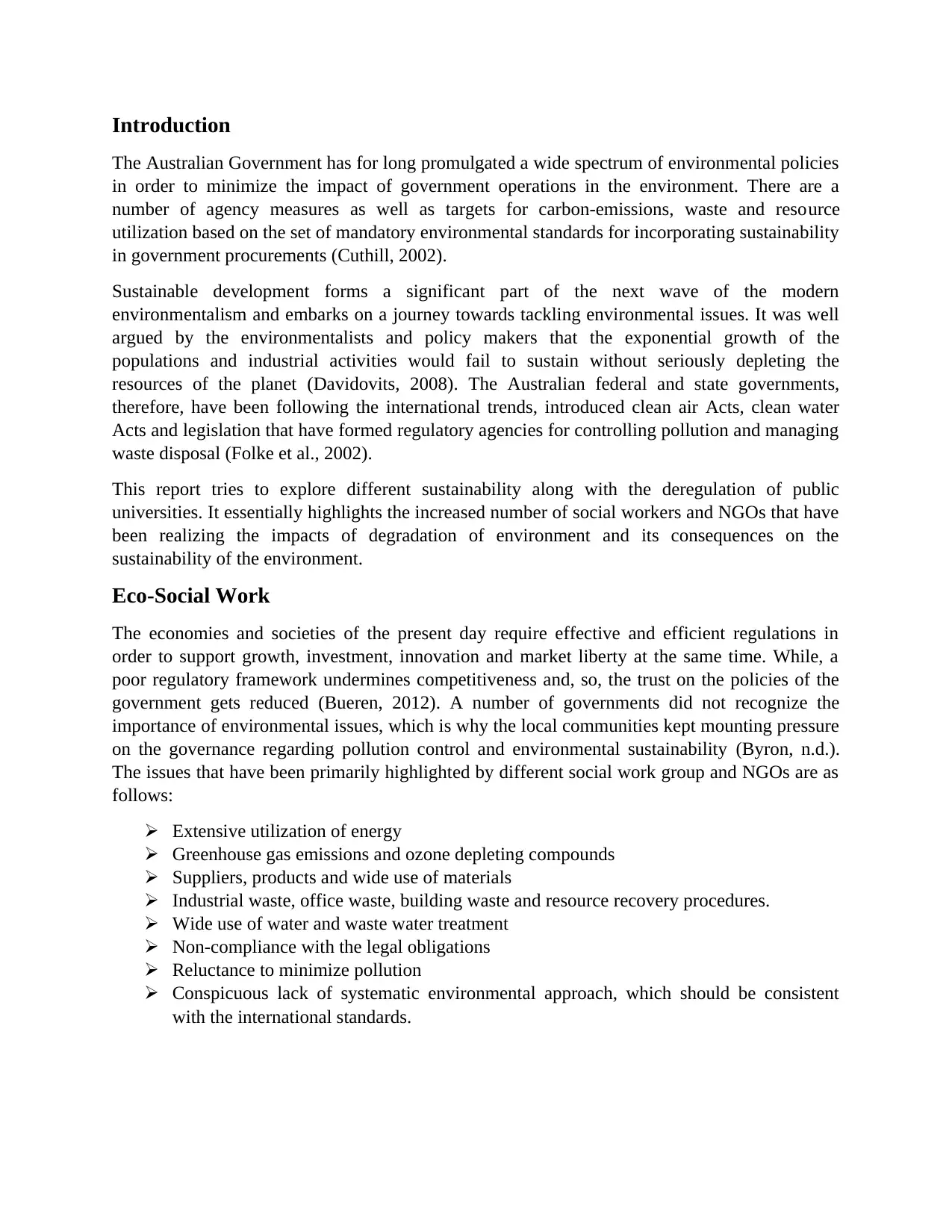
Introduction
The Australian Government has for long promulgated a wide spectrum of environmental policies
in order to minimize the impact of government operations in the environment. There are a
number of agency measures as well as targets for carbon-emissions, waste and resource
utilization based on the set of mandatory environmental standards for incorporating sustainability
in government procurements (Cuthill, 2002).
Sustainable development forms a significant part of the next wave of the modern
environmentalism and embarks on a journey towards tackling environmental issues. It was well
argued by the environmentalists and policy makers that the exponential growth of the
populations and industrial activities would fail to sustain without seriously depleting the
resources of the planet (Davidovits, 2008). The Australian federal and state governments,
therefore, have been following the international trends, introduced clean air Acts, clean water
Acts and legislation that have formed regulatory agencies for controlling pollution and managing
waste disposal (Folke et al., 2002).
This report tries to explore different sustainability along with the deregulation of public
universities. It essentially highlights the increased number of social workers and NGOs that have
been realizing the impacts of degradation of environment and its consequences on the
sustainability of the environment.
Eco-Social Work
The economies and societies of the present day require effective and efficient regulations in
order to support growth, investment, innovation and market liberty at the same time. While, a
poor regulatory framework undermines competitiveness and, so, the trust on the policies of the
government gets reduced (Bueren, 2012). A number of governments did not recognize the
importance of environmental issues, which is why the local communities kept mounting pressure
on the governance regarding pollution control and environmental sustainability (Byron, n.d.).
The issues that have been primarily highlighted by different social work group and NGOs are as
follows:
Extensive utilization of energy
Greenhouse gas emissions and ozone depleting compounds
Suppliers, products and wide use of materials
Industrial waste, office waste, building waste and resource recovery procedures.
Wide use of water and waste water treatment
Non-compliance with the legal obligations
Reluctance to minimize pollution
Conspicuous lack of systematic environmental approach, which should be consistent
with the international standards.
The Australian Government has for long promulgated a wide spectrum of environmental policies
in order to minimize the impact of government operations in the environment. There are a
number of agency measures as well as targets for carbon-emissions, waste and resource
utilization based on the set of mandatory environmental standards for incorporating sustainability
in government procurements (Cuthill, 2002).
Sustainable development forms a significant part of the next wave of the modern
environmentalism and embarks on a journey towards tackling environmental issues. It was well
argued by the environmentalists and policy makers that the exponential growth of the
populations and industrial activities would fail to sustain without seriously depleting the
resources of the planet (Davidovits, 2008). The Australian federal and state governments,
therefore, have been following the international trends, introduced clean air Acts, clean water
Acts and legislation that have formed regulatory agencies for controlling pollution and managing
waste disposal (Folke et al., 2002).
This report tries to explore different sustainability along with the deregulation of public
universities. It essentially highlights the increased number of social workers and NGOs that have
been realizing the impacts of degradation of environment and its consequences on the
sustainability of the environment.
Eco-Social Work
The economies and societies of the present day require effective and efficient regulations in
order to support growth, investment, innovation and market liberty at the same time. While, a
poor regulatory framework undermines competitiveness and, so, the trust on the policies of the
government gets reduced (Bueren, 2012). A number of governments did not recognize the
importance of environmental issues, which is why the local communities kept mounting pressure
on the governance regarding pollution control and environmental sustainability (Byron, n.d.).
The issues that have been primarily highlighted by different social work group and NGOs are as
follows:
Extensive utilization of energy
Greenhouse gas emissions and ozone depleting compounds
Suppliers, products and wide use of materials
Industrial waste, office waste, building waste and resource recovery procedures.
Wide use of water and waste water treatment
Non-compliance with the legal obligations
Reluctance to minimize pollution
Conspicuous lack of systematic environmental approach, which should be consistent
with the international standards.
Secure Best Marks with AI Grader
Need help grading? Try our AI Grader for instant feedback on your assignments.
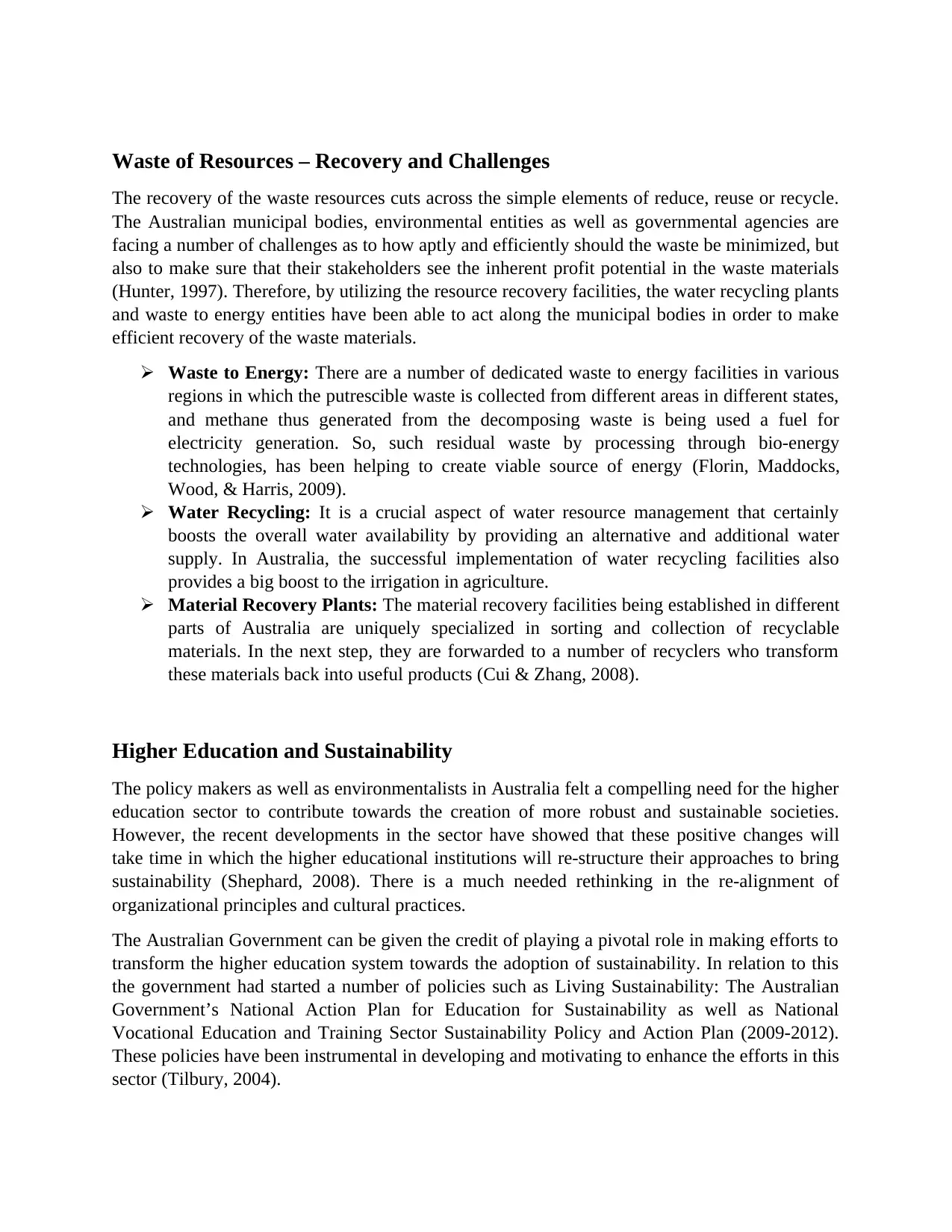
Waste of Resources – Recovery and Challenges
The recovery of the waste resources cuts across the simple elements of reduce, reuse or recycle.
The Australian municipal bodies, environmental entities as well as governmental agencies are
facing a number of challenges as to how aptly and efficiently should the waste be minimized, but
also to make sure that their stakeholders see the inherent profit potential in the waste materials
(Hunter, 1997). Therefore, by utilizing the resource recovery facilities, the water recycling plants
and waste to energy entities have been able to act along the municipal bodies in order to make
efficient recovery of the waste materials.
Waste to Energy: There are a number of dedicated waste to energy facilities in various
regions in which the putrescible waste is collected from different areas in different states,
and methane thus generated from the decomposing waste is being used a fuel for
electricity generation. So, such residual waste by processing through bio-energy
technologies, has been helping to create viable source of energy (Florin, Maddocks,
Wood, & Harris, 2009).
Water Recycling: It is a crucial aspect of water resource management that certainly
boosts the overall water availability by providing an alternative and additional water
supply. In Australia, the successful implementation of water recycling facilities also
provides a big boost to the irrigation in agriculture.
Material Recovery Plants: The material recovery facilities being established in different
parts of Australia are uniquely specialized in sorting and collection of recyclable
materials. In the next step, they are forwarded to a number of recyclers who transform
these materials back into useful products (Cui & Zhang, 2008).
Higher Education and Sustainability
The policy makers as well as environmentalists in Australia felt a compelling need for the higher
education sector to contribute towards the creation of more robust and sustainable societies.
However, the recent developments in the sector have showed that these positive changes will
take time in which the higher educational institutions will re-structure their approaches to bring
sustainability (Shephard, 2008). There is a much needed rethinking in the re-alignment of
organizational principles and cultural practices.
The Australian Government can be given the credit of playing a pivotal role in making efforts to
transform the higher education system towards the adoption of sustainability. In relation to this
the government had started a number of policies such as Living Sustainability: The Australian
Government’s National Action Plan for Education for Sustainability as well as National
Vocational Education and Training Sector Sustainability Policy and Action Plan (2009-2012).
These policies have been instrumental in developing and motivating to enhance the efforts in this
sector (Tilbury, 2004).
The recovery of the waste resources cuts across the simple elements of reduce, reuse or recycle.
The Australian municipal bodies, environmental entities as well as governmental agencies are
facing a number of challenges as to how aptly and efficiently should the waste be minimized, but
also to make sure that their stakeholders see the inherent profit potential in the waste materials
(Hunter, 1997). Therefore, by utilizing the resource recovery facilities, the water recycling plants
and waste to energy entities have been able to act along the municipal bodies in order to make
efficient recovery of the waste materials.
Waste to Energy: There are a number of dedicated waste to energy facilities in various
regions in which the putrescible waste is collected from different areas in different states,
and methane thus generated from the decomposing waste is being used a fuel for
electricity generation. So, such residual waste by processing through bio-energy
technologies, has been helping to create viable source of energy (Florin, Maddocks,
Wood, & Harris, 2009).
Water Recycling: It is a crucial aspect of water resource management that certainly
boosts the overall water availability by providing an alternative and additional water
supply. In Australia, the successful implementation of water recycling facilities also
provides a big boost to the irrigation in agriculture.
Material Recovery Plants: The material recovery facilities being established in different
parts of Australia are uniquely specialized in sorting and collection of recyclable
materials. In the next step, they are forwarded to a number of recyclers who transform
these materials back into useful products (Cui & Zhang, 2008).
Higher Education and Sustainability
The policy makers as well as environmentalists in Australia felt a compelling need for the higher
education sector to contribute towards the creation of more robust and sustainable societies.
However, the recent developments in the sector have showed that these positive changes will
take time in which the higher educational institutions will re-structure their approaches to bring
sustainability (Shephard, 2008). There is a much needed rethinking in the re-alignment of
organizational principles and cultural practices.
The Australian Government can be given the credit of playing a pivotal role in making efforts to
transform the higher education system towards the adoption of sustainability. In relation to this
the government had started a number of policies such as Living Sustainability: The Australian
Government’s National Action Plan for Education for Sustainability as well as National
Vocational Education and Training Sector Sustainability Policy and Action Plan (2009-2012).
These policies have been instrumental in developing and motivating to enhance the efforts in this
sector (Tilbury, 2004).
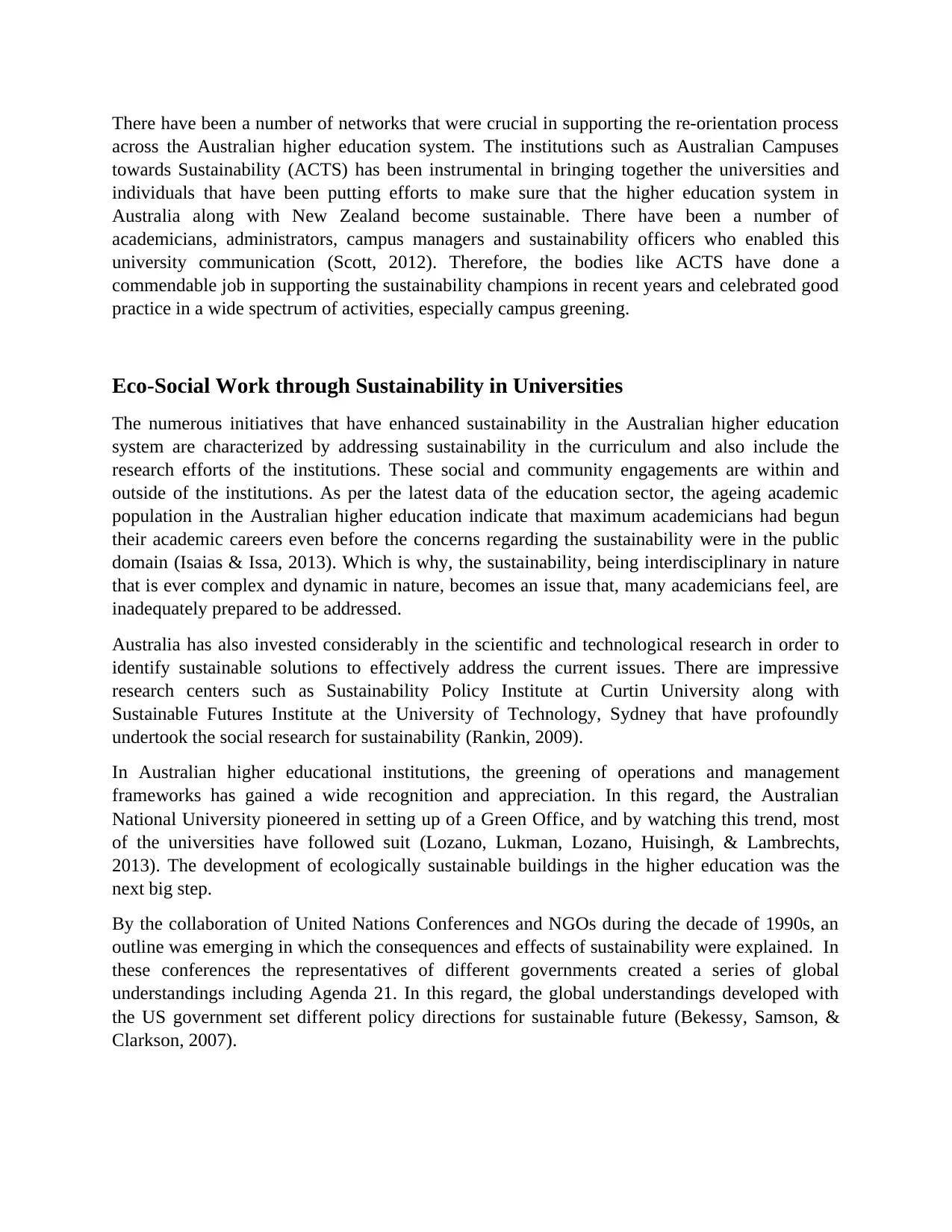
There have been a number of networks that were crucial in supporting the re-orientation process
across the Australian higher education system. The institutions such as Australian Campuses
towards Sustainability (ACTS) has been instrumental in bringing together the universities and
individuals that have been putting efforts to make sure that the higher education system in
Australia along with New Zealand become sustainable. There have been a number of
academicians, administrators, campus managers and sustainability officers who enabled this
university communication (Scott, 2012). Therefore, the bodies like ACTS have done a
commendable job in supporting the sustainability champions in recent years and celebrated good
practice in a wide spectrum of activities, especially campus greening.
Eco-Social Work through Sustainability in Universities
The numerous initiatives that have enhanced sustainability in the Australian higher education
system are characterized by addressing sustainability in the curriculum and also include the
research efforts of the institutions. These social and community engagements are within and
outside of the institutions. As per the latest data of the education sector, the ageing academic
population in the Australian higher education indicate that maximum academicians had begun
their academic careers even before the concerns regarding the sustainability were in the public
domain (Isaias & Issa, 2013). Which is why, the sustainability, being interdisciplinary in nature
that is ever complex and dynamic in nature, becomes an issue that, many academicians feel, are
inadequately prepared to be addressed.
Australia has also invested considerably in the scientific and technological research in order to
identify sustainable solutions to effectively address the current issues. There are impressive
research centers such as Sustainability Policy Institute at Curtin University along with
Sustainable Futures Institute at the University of Technology, Sydney that have profoundly
undertook the social research for sustainability (Rankin, 2009).
In Australian higher educational institutions, the greening of operations and management
frameworks has gained a wide recognition and appreciation. In this regard, the Australian
National University pioneered in setting up of a Green Office, and by watching this trend, most
of the universities have followed suit (Lozano, Lukman, Lozano, Huisingh, & Lambrechts,
2013). The development of ecologically sustainable buildings in the higher education was the
next big step.
By the collaboration of United Nations Conferences and NGOs during the decade of 1990s, an
outline was emerging in which the consequences and effects of sustainability were explained. In
these conferences the representatives of different governments created a series of global
understandings including Agenda 21. In this regard, the global understandings developed with
the US government set different policy directions for sustainable future (Bekessy, Samson, &
Clarkson, 2007).
across the Australian higher education system. The institutions such as Australian Campuses
towards Sustainability (ACTS) has been instrumental in bringing together the universities and
individuals that have been putting efforts to make sure that the higher education system in
Australia along with New Zealand become sustainable. There have been a number of
academicians, administrators, campus managers and sustainability officers who enabled this
university communication (Scott, 2012). Therefore, the bodies like ACTS have done a
commendable job in supporting the sustainability champions in recent years and celebrated good
practice in a wide spectrum of activities, especially campus greening.
Eco-Social Work through Sustainability in Universities
The numerous initiatives that have enhanced sustainability in the Australian higher education
system are characterized by addressing sustainability in the curriculum and also include the
research efforts of the institutions. These social and community engagements are within and
outside of the institutions. As per the latest data of the education sector, the ageing academic
population in the Australian higher education indicate that maximum academicians had begun
their academic careers even before the concerns regarding the sustainability were in the public
domain (Isaias & Issa, 2013). Which is why, the sustainability, being interdisciplinary in nature
that is ever complex and dynamic in nature, becomes an issue that, many academicians feel, are
inadequately prepared to be addressed.
Australia has also invested considerably in the scientific and technological research in order to
identify sustainable solutions to effectively address the current issues. There are impressive
research centers such as Sustainability Policy Institute at Curtin University along with
Sustainable Futures Institute at the University of Technology, Sydney that have profoundly
undertook the social research for sustainability (Rankin, 2009).
In Australian higher educational institutions, the greening of operations and management
frameworks has gained a wide recognition and appreciation. In this regard, the Australian
National University pioneered in setting up of a Green Office, and by watching this trend, most
of the universities have followed suit (Lozano, Lukman, Lozano, Huisingh, & Lambrechts,
2013). The development of ecologically sustainable buildings in the higher education was the
next big step.
By the collaboration of United Nations Conferences and NGOs during the decade of 1990s, an
outline was emerging in which the consequences and effects of sustainability were explained. In
these conferences the representatives of different governments created a series of global
understandings including Agenda 21. In this regard, the global understandings developed with
the US government set different policy directions for sustainable future (Bekessy, Samson, &
Clarkson, 2007).
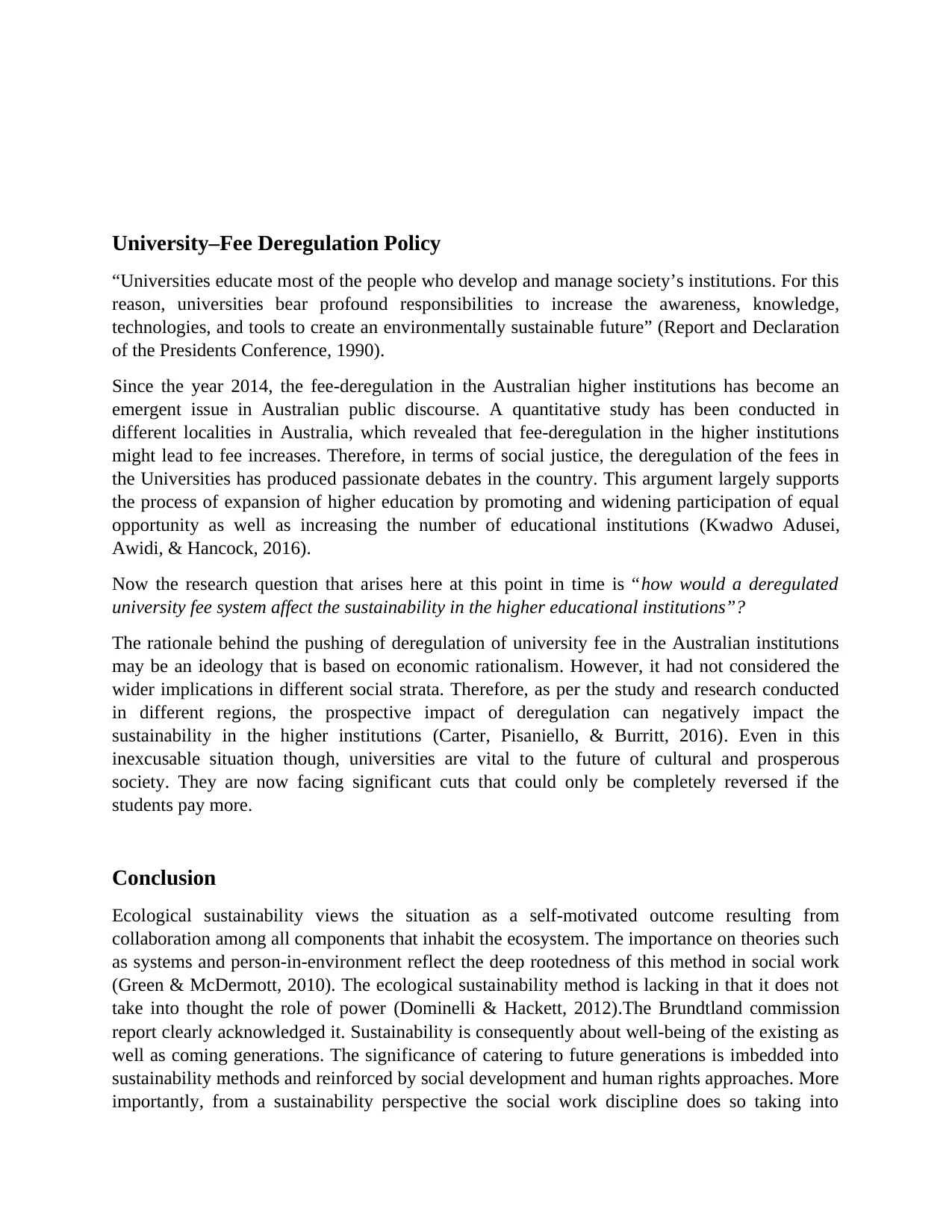
University–Fee Deregulation Policy
“Universities educate most of the people who develop and manage society’s institutions. For this
reason, universities bear profound responsibilities to increase the awareness, knowledge,
technologies, and tools to create an environmentally sustainable future” (Report and Declaration
of the Presidents Conference, 1990).
Since the year 2014, the fee-deregulation in the Australian higher institutions has become an
emergent issue in Australian public discourse. A quantitative study has been conducted in
different localities in Australia, which revealed that fee-deregulation in the higher institutions
might lead to fee increases. Therefore, in terms of social justice, the deregulation of the fees in
the Universities has produced passionate debates in the country. This argument largely supports
the process of expansion of higher education by promoting and widening participation of equal
opportunity as well as increasing the number of educational institutions (Kwadwo Adusei,
Awidi, & Hancock, 2016).
Now the research question that arises here at this point in time is “how would a deregulated
university fee system affect the sustainability in the higher educational institutions”?
The rationale behind the pushing of deregulation of university fee in the Australian institutions
may be an ideology that is based on economic rationalism. However, it had not considered the
wider implications in different social strata. Therefore, as per the study and research conducted
in different regions, the prospective impact of deregulation can negatively impact the
sustainability in the higher institutions (Carter, Pisaniello, & Burritt, 2016). Even in this
inexcusable situation though, universities are vital to the future of cultural and prosperous
society. They are now facing significant cuts that could only be completely reversed if the
students pay more.
Conclusion
Ecological sustainability views the situation as a self-motivated outcome resulting from
collaboration among all components that inhabit the ecosystem. The importance on theories such
as systems and person-in-environment reflect the deep rootedness of this method in social work
(Green & McDermott, 2010). The ecological sustainability method is lacking in that it does not
take into thought the role of power (Dominelli & Hackett, 2012).The Brundtland commission
report clearly acknowledged it. Sustainability is consequently about well-being of the existing as
well as coming generations. The significance of catering to future generations is imbedded into
sustainability methods and reinforced by social development and human rights approaches. More
importantly, from a sustainability perspective the social work discipline does so taking into
“Universities educate most of the people who develop and manage society’s institutions. For this
reason, universities bear profound responsibilities to increase the awareness, knowledge,
technologies, and tools to create an environmentally sustainable future” (Report and Declaration
of the Presidents Conference, 1990).
Since the year 2014, the fee-deregulation in the Australian higher institutions has become an
emergent issue in Australian public discourse. A quantitative study has been conducted in
different localities in Australia, which revealed that fee-deregulation in the higher institutions
might lead to fee increases. Therefore, in terms of social justice, the deregulation of the fees in
the Universities has produced passionate debates in the country. This argument largely supports
the process of expansion of higher education by promoting and widening participation of equal
opportunity as well as increasing the number of educational institutions (Kwadwo Adusei,
Awidi, & Hancock, 2016).
Now the research question that arises here at this point in time is “how would a deregulated
university fee system affect the sustainability in the higher educational institutions”?
The rationale behind the pushing of deregulation of university fee in the Australian institutions
may be an ideology that is based on economic rationalism. However, it had not considered the
wider implications in different social strata. Therefore, as per the study and research conducted
in different regions, the prospective impact of deregulation can negatively impact the
sustainability in the higher institutions (Carter, Pisaniello, & Burritt, 2016). Even in this
inexcusable situation though, universities are vital to the future of cultural and prosperous
society. They are now facing significant cuts that could only be completely reversed if the
students pay more.
Conclusion
Ecological sustainability views the situation as a self-motivated outcome resulting from
collaboration among all components that inhabit the ecosystem. The importance on theories such
as systems and person-in-environment reflect the deep rootedness of this method in social work
(Green & McDermott, 2010). The ecological sustainability method is lacking in that it does not
take into thought the role of power (Dominelli & Hackett, 2012).The Brundtland commission
report clearly acknowledged it. Sustainability is consequently about well-being of the existing as
well as coming generations. The significance of catering to future generations is imbedded into
sustainability methods and reinforced by social development and human rights approaches. More
importantly, from a sustainability perspective the social work discipline does so taking into
Secure Best Marks with AI Grader
Need help grading? Try our AI Grader for instant feedback on your assignments.
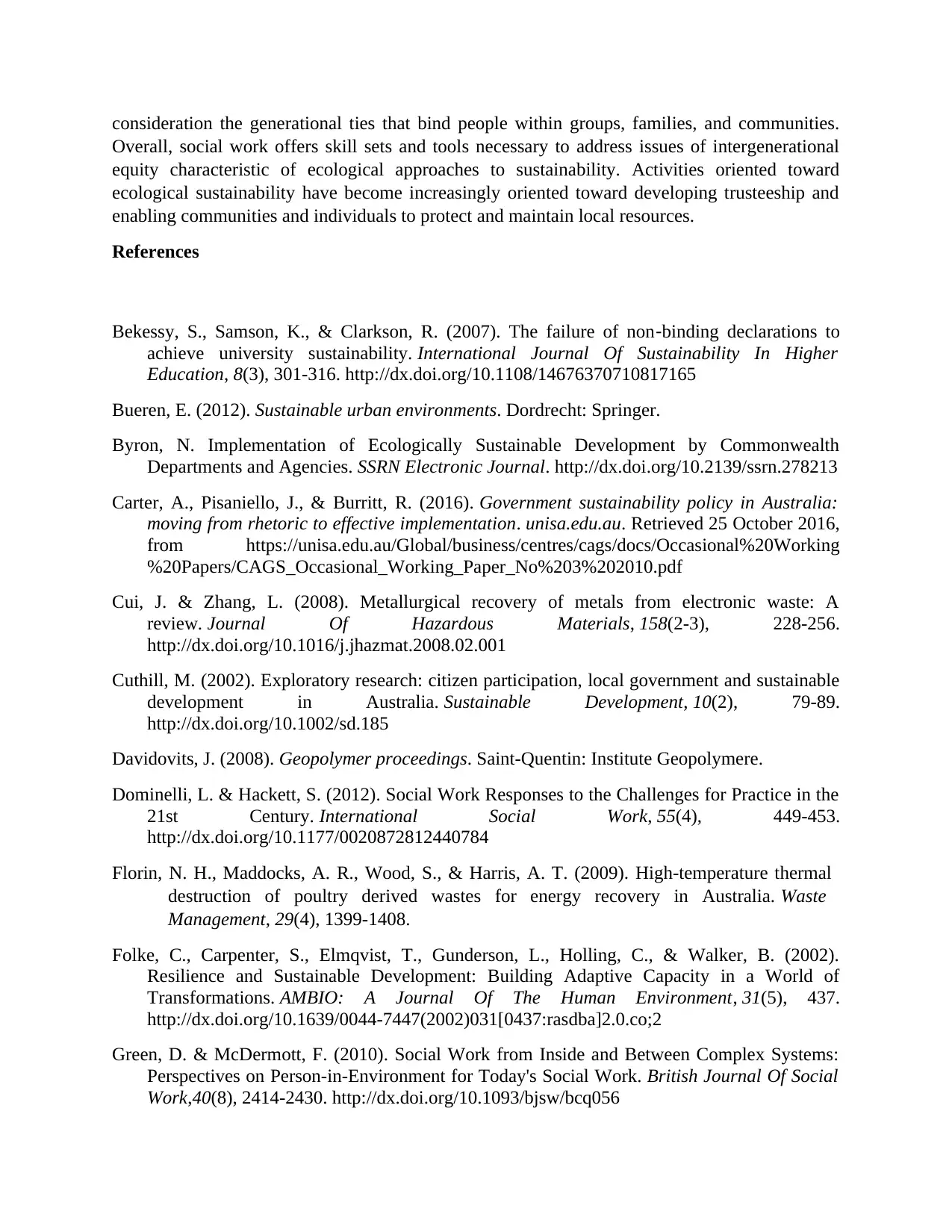
consideration the generational ties that bind people within groups, families, and communities.
Overall, social work offers skill sets and tools necessary to address issues of intergenerational
equity characteristic of ecological approaches to sustainability. Activities oriented toward
ecological sustainability have become increasingly oriented toward developing trusteeship and
enabling communities and individuals to protect and maintain local resources.
References
Bekessy, S., Samson, K., & Clarkson, R. (2007). The failure of non‐binding declarations to
achieve university sustainability. International Journal Of Sustainability In Higher
Education, 8(3), 301-316. http://dx.doi.org/10.1108/14676370710817165
Bueren, E. (2012). Sustainable urban environments. Dordrecht: Springer.
Byron, N. Implementation of Ecologically Sustainable Development by Commonwealth
Departments and Agencies. SSRN Electronic Journal. http://dx.doi.org/10.2139/ssrn.278213
Carter, A., Pisaniello, J., & Burritt, R. (2016). Government sustainability policy in Australia:
moving from rhetoric to effective implementation. unisa.edu.au. Retrieved 25 October 2016,
from https://unisa.edu.au/Global/business/centres/cags/docs/Occasional%20Working
%20Papers/CAGS_Occasional_Working_Paper_No%203%202010.pdf
Cui, J. & Zhang, L. (2008). Metallurgical recovery of metals from electronic waste: A
review. Journal Of Hazardous Materials, 158(2-3), 228-256.
http://dx.doi.org/10.1016/j.jhazmat.2008.02.001
Cuthill, M. (2002). Exploratory research: citizen participation, local government and sustainable
development in Australia. Sustainable Development, 10(2), 79-89.
http://dx.doi.org/10.1002/sd.185
Davidovits, J. (2008). Geopolymer proceedings. Saint-Quentin: Institute Geopolymere.
Dominelli, L. & Hackett, S. (2012). Social Work Responses to the Challenges for Practice in the
21st Century. International Social Work, 55(4), 449-453.
http://dx.doi.org/10.1177/0020872812440784
Florin, N. H., Maddocks, A. R., Wood, S., & Harris, A. T. (2009). High-temperature thermal
destruction of poultry derived wastes for energy recovery in Australia. Waste
Management, 29(4), 1399-1408.
Folke, C., Carpenter, S., Elmqvist, T., Gunderson, L., Holling, C., & Walker, B. (2002).
Resilience and Sustainable Development: Building Adaptive Capacity in a World of
Transformations. AMBIO: A Journal Of The Human Environment, 31(5), 437.
http://dx.doi.org/10.1639/0044-7447(2002)031[0437:rasdba]2.0.co;2
Green, D. & McDermott, F. (2010). Social Work from Inside and Between Complex Systems:
Perspectives on Person-in-Environment for Today's Social Work. British Journal Of Social
Work,40(8), 2414-2430. http://dx.doi.org/10.1093/bjsw/bcq056
Overall, social work offers skill sets and tools necessary to address issues of intergenerational
equity characteristic of ecological approaches to sustainability. Activities oriented toward
ecological sustainability have become increasingly oriented toward developing trusteeship and
enabling communities and individuals to protect and maintain local resources.
References
Bekessy, S., Samson, K., & Clarkson, R. (2007). The failure of non‐binding declarations to
achieve university sustainability. International Journal Of Sustainability In Higher
Education, 8(3), 301-316. http://dx.doi.org/10.1108/14676370710817165
Bueren, E. (2012). Sustainable urban environments. Dordrecht: Springer.
Byron, N. Implementation of Ecologically Sustainable Development by Commonwealth
Departments and Agencies. SSRN Electronic Journal. http://dx.doi.org/10.2139/ssrn.278213
Carter, A., Pisaniello, J., & Burritt, R. (2016). Government sustainability policy in Australia:
moving from rhetoric to effective implementation. unisa.edu.au. Retrieved 25 October 2016,
from https://unisa.edu.au/Global/business/centres/cags/docs/Occasional%20Working
%20Papers/CAGS_Occasional_Working_Paper_No%203%202010.pdf
Cui, J. & Zhang, L. (2008). Metallurgical recovery of metals from electronic waste: A
review. Journal Of Hazardous Materials, 158(2-3), 228-256.
http://dx.doi.org/10.1016/j.jhazmat.2008.02.001
Cuthill, M. (2002). Exploratory research: citizen participation, local government and sustainable
development in Australia. Sustainable Development, 10(2), 79-89.
http://dx.doi.org/10.1002/sd.185
Davidovits, J. (2008). Geopolymer proceedings. Saint-Quentin: Institute Geopolymere.
Dominelli, L. & Hackett, S. (2012). Social Work Responses to the Challenges for Practice in the
21st Century. International Social Work, 55(4), 449-453.
http://dx.doi.org/10.1177/0020872812440784
Florin, N. H., Maddocks, A. R., Wood, S., & Harris, A. T. (2009). High-temperature thermal
destruction of poultry derived wastes for energy recovery in Australia. Waste
Management, 29(4), 1399-1408.
Folke, C., Carpenter, S., Elmqvist, T., Gunderson, L., Holling, C., & Walker, B. (2002).
Resilience and Sustainable Development: Building Adaptive Capacity in a World of
Transformations. AMBIO: A Journal Of The Human Environment, 31(5), 437.
http://dx.doi.org/10.1639/0044-7447(2002)031[0437:rasdba]2.0.co;2
Green, D. & McDermott, F. (2010). Social Work from Inside and Between Complex Systems:
Perspectives on Person-in-Environment for Today's Social Work. British Journal Of Social
Work,40(8), 2414-2430. http://dx.doi.org/10.1093/bjsw/bcq056
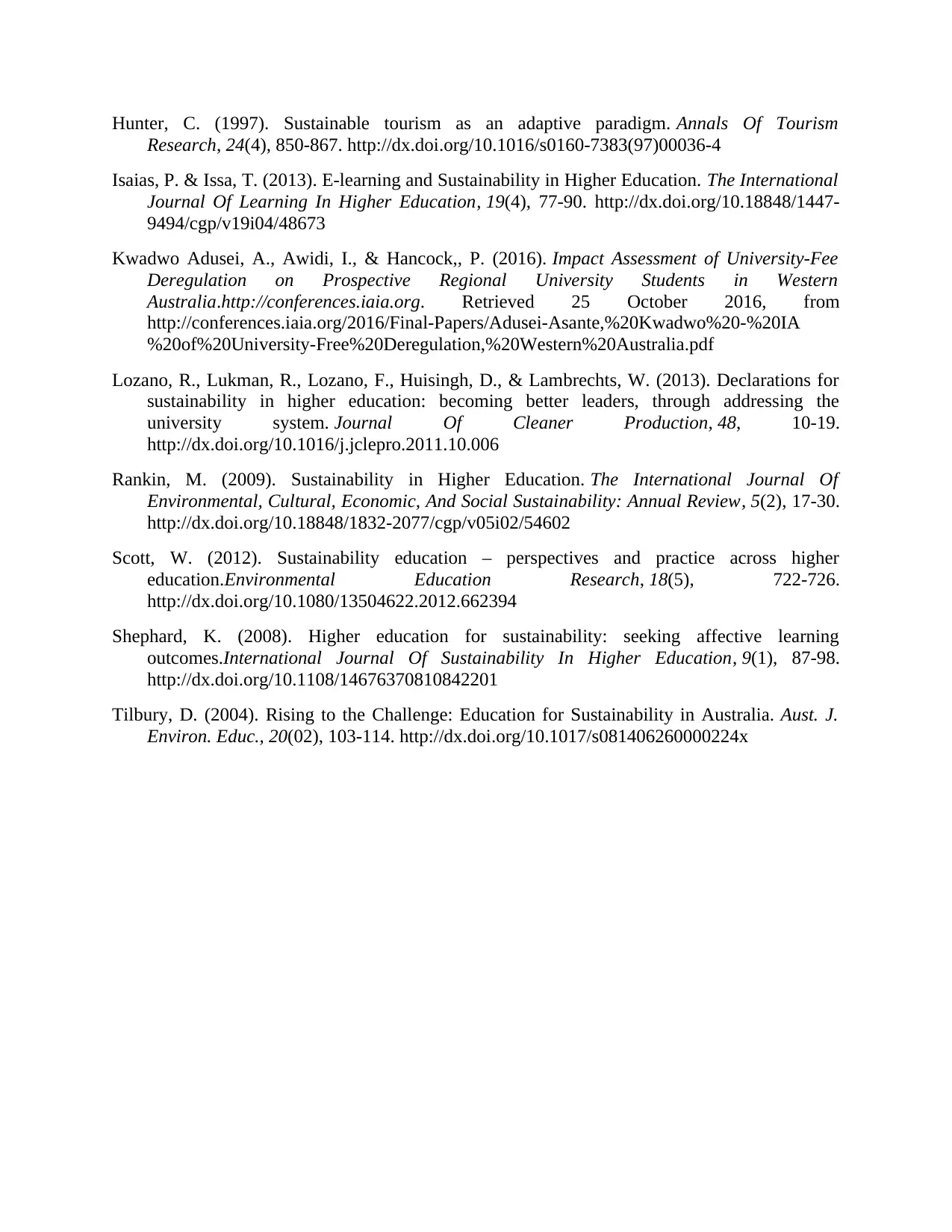
Hunter, C. (1997). Sustainable tourism as an adaptive paradigm. Annals Of Tourism
Research, 24(4), 850-867. http://dx.doi.org/10.1016/s0160-7383(97)00036-4
Isaias, P. & Issa, T. (2013). E-learning and Sustainability in Higher Education. The International
Journal Of Learning In Higher Education, 19(4), 77-90. http://dx.doi.org/10.18848/1447-
9494/cgp/v19i04/48673
Kwadwo Adusei, A., Awidi, I., & Hancock,, P. (2016). Impact Assessment of University-Fee
Deregulation on Prospective Regional University Students in Western
Australia.http://conferences.iaia.org. Retrieved 25 October 2016, from
http://conferences.iaia.org/2016/Final-Papers/Adusei-Asante,%20Kwadwo%20-%20IA
%20of%20University-Free%20Deregulation,%20Western%20Australia.pdf
Lozano, R., Lukman, R., Lozano, F., Huisingh, D., & Lambrechts, W. (2013). Declarations for
sustainability in higher education: becoming better leaders, through addressing the
university system. Journal Of Cleaner Production, 48, 10-19.
http://dx.doi.org/10.1016/j.jclepro.2011.10.006
Rankin, M. (2009). Sustainability in Higher Education. The International Journal Of
Environmental, Cultural, Economic, And Social Sustainability: Annual Review, 5(2), 17-30.
http://dx.doi.org/10.18848/1832-2077/cgp/v05i02/54602
Scott, W. (2012). Sustainability education – perspectives and practice across higher
education.Environmental Education Research, 18(5), 722-726.
http://dx.doi.org/10.1080/13504622.2012.662394
Shephard, K. (2008). Higher education for sustainability: seeking affective learning
outcomes.International Journal Of Sustainability In Higher Education, 9(1), 87-98.
http://dx.doi.org/10.1108/14676370810842201
Tilbury, D. (2004). Rising to the Challenge: Education for Sustainability in Australia. Aust. J.
Environ. Educ., 20(02), 103-114. http://dx.doi.org/10.1017/s081406260000224x
Research, 24(4), 850-867. http://dx.doi.org/10.1016/s0160-7383(97)00036-4
Isaias, P. & Issa, T. (2013). E-learning and Sustainability in Higher Education. The International
Journal Of Learning In Higher Education, 19(4), 77-90. http://dx.doi.org/10.18848/1447-
9494/cgp/v19i04/48673
Kwadwo Adusei, A., Awidi, I., & Hancock,, P. (2016). Impact Assessment of University-Fee
Deregulation on Prospective Regional University Students in Western
Australia.http://conferences.iaia.org. Retrieved 25 October 2016, from
http://conferences.iaia.org/2016/Final-Papers/Adusei-Asante,%20Kwadwo%20-%20IA
%20of%20University-Free%20Deregulation,%20Western%20Australia.pdf
Lozano, R., Lukman, R., Lozano, F., Huisingh, D., & Lambrechts, W. (2013). Declarations for
sustainability in higher education: becoming better leaders, through addressing the
university system. Journal Of Cleaner Production, 48, 10-19.
http://dx.doi.org/10.1016/j.jclepro.2011.10.006
Rankin, M. (2009). Sustainability in Higher Education. The International Journal Of
Environmental, Cultural, Economic, And Social Sustainability: Annual Review, 5(2), 17-30.
http://dx.doi.org/10.18848/1832-2077/cgp/v05i02/54602
Scott, W. (2012). Sustainability education – perspectives and practice across higher
education.Environmental Education Research, 18(5), 722-726.
http://dx.doi.org/10.1080/13504622.2012.662394
Shephard, K. (2008). Higher education for sustainability: seeking affective learning
outcomes.International Journal Of Sustainability In Higher Education, 9(1), 87-98.
http://dx.doi.org/10.1108/14676370810842201
Tilbury, D. (2004). Rising to the Challenge: Education for Sustainability in Australia. Aust. J.
Environ. Educ., 20(02), 103-114. http://dx.doi.org/10.1017/s081406260000224x
1 out of 6
Related Documents
Your All-in-One AI-Powered Toolkit for Academic Success.
+13062052269
info@desklib.com
Available 24*7 on WhatsApp / Email
![[object Object]](/_next/static/media/star-bottom.7253800d.svg)
Unlock your academic potential
© 2024 | Zucol Services PVT LTD | All rights reserved.





